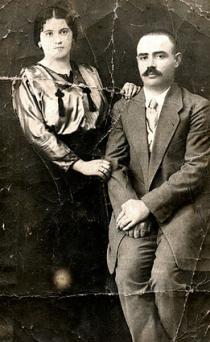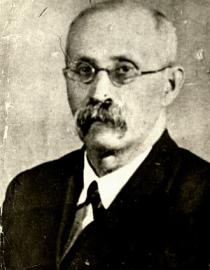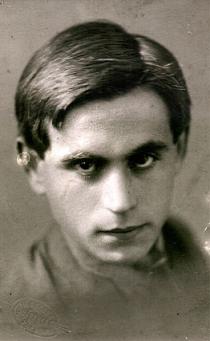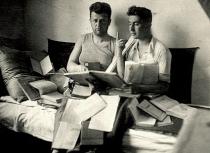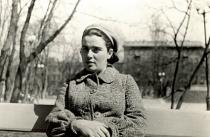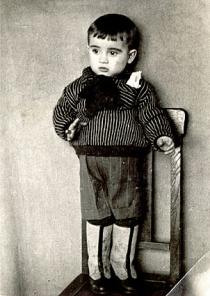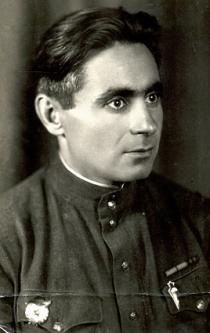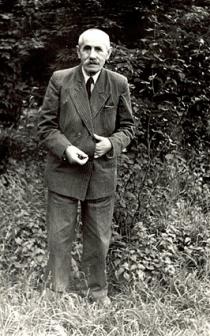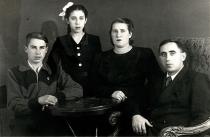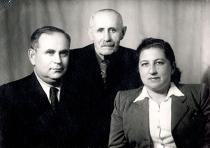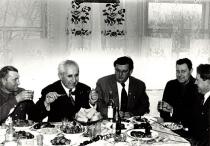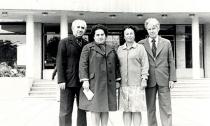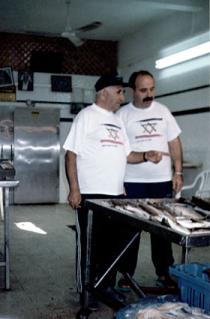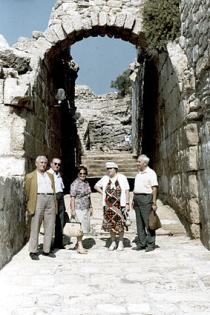I with my fellow student Seva. This amateur photo was taken in the hostel of the Agricultural College where I lived during preparation to my exams. Kiev, 1936.
I was born in 1917 in Belaya Tserkov. I finished seven forms in the Jewish school. I became a young Octobrist, a pioneer and Komsomol member at school like all other schoolchildren. This was a standard process and everybody had to follow it, but I took no interest in public life. At that time the period of forced famine began. It became hard to survive in Belaya Tserkov. Not many people could get food for their families. In 1932 I left my home. At that same time I put an end to the observance of Jewish traditions. My brother Matvey was working in Kharkov already. There was a Jewish technical school in Kharkov. I guess, it was the Transport School. I entered it. My brother supported me and I lived with him. Besides, Matvey helped me to become a light operator at the theater. So, it depended on me whether a performance was to take place or not! I studied for over a year, when the theater moved to Kiev. Matvey also moved to Kiev and I followed him. My brother entered the Academy and lived in a hostel. He had to live his own life and I had to take care of mine.
I had to continue studies was something that I was sure of. Where was I to go? There was no Jewish school or higher secondary school in Kiev. I went to a rabfak school and to work. My uncle Horatsiy, who was an engineer at the plant, used his connections to have me employed by the plant. There was no other way to get a job there: there were numbers of people coming to Kiev from surrounding villages searching for a job and food. I was 15 years old and I worked at the storage office. After finishing the rabfak I entered Agricultural College, present Agricultural Academy. I finished the Faculty of Mechanization at the Academy in 1939. I got a job assignment to Chernigov [regional center, about 150 km from Kiev], where I was a shop superintendent. We also studied military disciplines in college and after finishing it I became a reserve lieutenant of armored troops. I worked at the vehicle and tractor plant in Chernigov. There I was mobilized for two months. I was directed to inspect the army equipment with a traffic police representative. Two months later I returned to the plant. Then there was another mobilization for two months. I wanted to move to Kiev. I asked the registry office to issue a certificate saying that I ‘was recruited to the army’ and I quit the plant on the basis of this certificate. When those two months of mobilization were over, I was free to go to Kiev. In Kiev I applied for a job at aviation plant # 454. They took 15 days to check my documents. I went to visit my father in Belaya Tserkov and then decided to go back to Kiev few days before these 15 days were over. There was to be a football match that I wanted to see. On my way back on 22 June 1941 I heard about the war and that Kiev was bombed… I decided that I had to go to the military registry office for mobilization. I went to the plant to pick my documents from there, but they said: ‘Oh, no, you already have a release from military service and you are employed!’ The plant evacuated to Kuibyshev on 1 July. We were the first plant to evacuate and I got tickets in a nice train! I was seeing a girl, a nice Jewish girl, I liked her, but I was not thinking of marriage yet. So I offered her to evacuate with me. She agreed instantly. The girl’s name was Anes Dubinskaya. Her mother was a common woman and I was an all right guy, so they agreed. Her older daughter was smart, though. She said: ‘What do you mean go with him? No. Let him marry her first!’ This is how it was then: you want her - you marry her. I said: ‘Let’s get married!’ We went to a registry office where our marriage was registered. So I got married.

